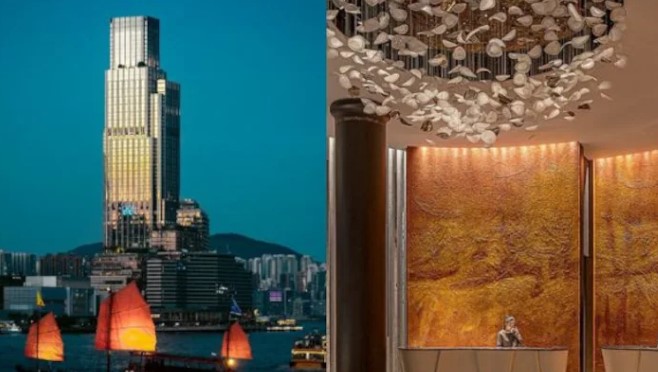
The world's top 50 hotels list is out, and 20 Asian hotels made the list. That is the highest representation from any region
The world's top 50 hotels list is out. And guess who swept the podium? First, second, and third place all went to hotels in Asia. Leading the pack was the six-year-old Rosewood Hong Kong, followed by more stellar properties across the region.
In total, 20 Asian hotels made it to the list, spanning Tokyo, India, Bali, Thailand and beyond. That is the highest representation from any region. Europe followed with 17 hotels, then North America with 6, Africa with 3, and Oceania and South America with 2 each.Now, before getting into what makes Asia such a hospitality powerhouse, here's a quick list of hotels from Asia that have made it onto the list:
- Rosewood Hong Kong, Hong Kong
- Four Seasons Bangkok at Chao Phraya River, Bangkok, Thailand
- Capella Bangkok, Bangkok, Thailand
- Raffles Singapore, Singapore
- Mandarin Oriental Bangkok, Bangkok, Thailand
- Upper House Hong Kong, Hong Kong
- Mandarin Oriental Qianmen, Beijing, China
- Bulgari Tokyo, Tokyo, Japan
- Aman Tokyo, Tokyo, Japan
- Jumeirah Marsa Al Arab, Dubai, UAE
- Soneva Fushi, Maldives
- The Lane, Dubai, UAE
- The Taj Mahal Palace, Mumbai, India
- Mandarin Oriental Hong Kong, Hong Kong
- The Tokyo Edition Toranomon, Tokyo, Japan
- Hotel The Mitsui, Kyoto, Japan
- Hoshinoya Tokyo, Tokyo, Japan
- Capella Hanoi, Hanoi, Vietnam
- The Peninsula Bangkok, Bangkok, Thailand
- Six Senses Yao Noi, Phang Nga, Thailand
Why Service In Asia Feels Different
Asia's hospitality isn't just good, it's instinctive. Many cultures across the region are built on warmth, respect and taking pride in caring for guests. Think of Thailand's easy smiles, Japan's quiet perfection, or India's age-old principle of treating guests as god (the Atithi Devo Bhava philosophy). These practices are not trends, they are inherited values that show up naturally in hotels - from the way staff greet you to how they anticipate needs before you ask.
The result is not just efficiency, but deeply personalised attention. Someone is always available to help, and service becomes proactive rather than reactive.
Emotional Intelligence Over Mere Efficiency
In Asia, hospitality training goes beyond professional etiquette. Staff are coached to read moods, anticipate unspoken cues and tailor experiences to individual guests. The aim is emotional warmth, not robotic politeness. This gives stays in Asia a human touch that lingers long after checkout.
It is service designed to make you feel seen and genuinely cared for - an intangible edge that cannot be replicated by process manuals alone.
Innovation And Tradition
Despite being rooted in culture, Asian hospitality is far from old-fashioned. Hotels across the region have been leaders in blending luxury with wellness, nature, and technology. From sustainable jungle retreats in Bali to futuristic business hotels in Singapore, the region balances tradition and progress with ease. Training institutions across Asia also now focus on emotional intelligence alongside technical skills, ensuring the experience keeps evolving.
Economic Growth Driving Global Ambitions
Rapid economic growth, booming tourism and rising middle-class luxury demand have pushed Asian hotels to innovate fast. As a result, hotels in the region are not only offering exceptional stays but also setting global benchmarks in experience, design, and service style.
Better Organisational Structure
Most of the hotels in Asia, have somewhat of a flattening the organisational structure so that staff at all levels feel empowered and valued, rather than strictly ranked by titles or positions.
In many Asian hospitality settings, the philosophy is that "hospitality is a team sport, not a title game."
For example, a general manager might clear a table or a housekeeper might personally greet a guest by name. This blurs rigid management lines and fosters a culture where everyone works together with shared responsibility for ensuring a guest's exceptional experience.
This flattening of hierarchy encourages empathy, collaboration, and emotional engagement rather than purely transactional service.
Employees are trained to read guests' body language and energy, anticipating their needs with warmth and intention instead of just following a checklist.
Everyone understands hospitality is a team sport, not a title game.
The Bottom Line
Asia's dominance in global hospitality is a mix of cultural instinct, emotional depth, strong workforce structures and a drive for excellence.
When a guest is welcomed not as a customer but as someone to genuinely look after, the result is unforgettable. And that is exactly what Asia continues to deliver, stay after stay.
Cheap Cost Of Labour = Personalised Care
There is also a practical advantage. Labour costs in many Asian countries allow hotels to maintain significantly higher staff-to-guest ratios than their Western counterparts. In India, hotels often employ between 1.5 to 1.8 staff per room. Compare that to 0.6 to 0.8 staff per room in places like the US.

















